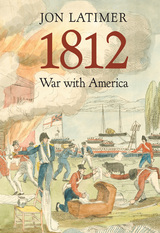
Listen to a short interview with Jon LatimerHost: Chris Gondek | Producer: Heron & Crane
In the first complete history of the War of 1812 written from a British perspective, Jon Latimer offers an authoritative and compelling account that places the conflict in its strategic context within the Napoleonic wars. The British viewed the War of 1812 as an ill-fated attempt by the young American republic to annex Canada. For British Canada, populated by many loyalists who had fled the American Revolution, this was a war for survival. The Americans aimed both to assert their nationhood on the global stage and to expand their territory northward and westward.
Americans would later find in this war many iconic moments in their national story--the bombardment of Fort McHenry (the inspiration for Francis Scott Key's "Star Spangled Banner"); the Battle of Lake Erie; the burning of Washington; the death of Tecumseh; Andrew Jackson's victory at New Orleans--but their war of conquest was ultimately a failure. Even the issues of neutrality and impressment that had triggered the war were not resolved in the peace treaty. For Britain, the war was subsumed under a long conflict to stop Napoleon and to preserve the empire. The one lasting result of the war was in Canada, where the British victory eliminated the threat of American conquest, and set Canadians on the road toward confederation.
Latimer describes events not merely through the eyes of generals, admirals, and politicians but through those of the soldiers, sailors, and ordinary people who were directly affected. Drawing on personal letters, diaries, and memoirs, he crafts an intimate narrative that marches the reader into the heat of battle.

"1819? At first sight, it might not seem a 'hot date'; but as James Chandler argues in his powerful book, it would be a mistake to overlook a year of such exceptional political conflagration and literary pyrotechnics in British history. Chandler's study is a wide-ranging, enormously ambitious, densely packed, closely argued work."—John Brewer, New Republic
"The book's largest argument, and the source of its considerable revelations, is that late twentieth-century practices of cultural history-writing have their roots in the peculiar Romantic historicism born in post-Waterloo Britain."—Jon Klancher, Times Literary Supplement
"A monumental work of scholarship."—Terry Eagleton, The Independent

This book is the first comprehensive study tracing the origins and growth of English radicalism from the time of John Wilkes’s defiant fight for the rights of parliamentary electors to the final suppression of radical societies in 1799. It spans the age of revolution in England as the revolution absorbed reverberations from the American colonies and France, and was sometimes diverted by happenings in Scotland and Ireland.
“The Friends of Liberty” was the name English reformers took under George Ill's reign as they fought aristocratic rule and imperial domination within the English empire and abroad. They supported universal manhood suffrage, annual parliaments, social justice, the right of association, and they fought government suppression. At the height of their activity they were attacked as Jacobins, but the unfair denigration only hastened the beginnings of working class political consciousness and the formation of English conservatism.
Albert Goodwin contributes greatly to a profound understanding of the origins of popular radicalism in three ways. He reifies radicalism in urban areas beyond London—in the provincial cities of Manchester, Sheffield, Norwich, Birmingham, Derby, and Leicester. He places radicalism into a continental context. Finally, he traces radical thought from its seventeenth-century origins, through metropolitan Wilkite radicalism, Painite republicanism, and to Godwinian and Spencerian utopianism.
READERS
Browse our collection.
PUBLISHERS
See BiblioVault's publisher services.
STUDENT SERVICES
Files for college accessibility offices.
UChicago Accessibility Resources
home | accessibility | search | about | contact us
BiblioVault ® 2001 - 2024
The University of Chicago Press









